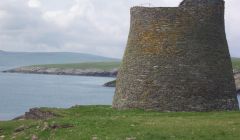Community / Biosecurity measures allow Mousa boat trips to continue
VISITS to Mousa will continue as normal after the operators of the ferry linking the Shetland mainland with the small uninhabited island put in place biosecurity measures to prevent the spread of avian flu.
Part owner of Mousa Boat, Rodney Smith, said they had been looking into protecting the island’s seabird colonies long before the authorities started to implement measures.
On Thursday, NatureScot advised not to visit a further 23 Scottish islands, including Ramna Stacks and Gruney in Shetland. Access to Noss had already been closed from 1 July.
The government agency has released guidance for both site managers and visitors on minimising risks for wild birds, biosecurity, and monitoring which can be found here.
Smith confirmed that a consultation with NatureScot had taken place.
People wanting to visit Mousa, famous for its large Iron Age broch, are required to go through a disinfectant footbath before entering the ferry for the 15 minute crossing.
On board they will get a detailed safety briefing on the threat bird flu poses to the wild bird population and how to reduce the chance of spreading the disease by sticking to the signed circular footpath and not to approach any nesting birds.
Smith said the Mousa Boat team were the only people in the isles who had implemented such measures and added they were not available at other locations in Shetland such as St Ninian’s Isle or Hermaness.
“When you walk over the foam it puts the disinfectant on the soles of your shoes, because this disease spreads through birds’ poo on your shoe, so you spread it with your feet,” he said.
“Going through the footbath should disinfect your shoes. You are just doing the best you can to prevent the spread of bird flu from colony to another.
“And if the visitors are sticking to the path and have disinfected their feet then there should be no problem at all.”
Become a member of Shetland News
Smith added: “These are our measures to try to keep our business going. They [NatureScot] seem to be happy enough with what we are doing, and they haven’t closed Mousa.
“We are the only people who have spent the money and have made the effort to try and minimise the spread of bird flu.”
A spokesperson for NatureScot said: “NatureScot has advised that public landings should be stopped on 23 small islands limiting the spread of avian flu and giving seabirds the best possible chance to survive and recover from the current severe outbreak.
“These are only the islands where it is not possible to land on the island without walking through colonies of ground nesting seabirds.
“Managers of other coastal seabird sites are providing advice to visitors to help them avoid walking through areas where birds are feeding, resting or breeding.”
The latest confirmed figures of H5NI positive wild bird cases in Scotland released by DEFRA are 537 cases among 28 species over 142 locations. Mainly affected are gannets, skuas, geese and gulls.
Smith continued by saying that they were experiencing “a fairly decent year” but due to two years of disruptions as a result of Covid and associated travel restrictions it was next to impossible to compare the current season with any previous ones.
The company runs six scheduled trips per week to Mousa plus additional runs for cruise ship visitors. The midnight trips to see the UK’s largest colony of European storm petrels have come to an end for this season.
Become a member of Shetland News
Shetland News is asking its many readers to consider paying for membership to get additional features and services: -
- Remove non-local ads;
- Bookmark posts to read later;
- Exclusive curated weekly newsletter;
- Hide membership messages;
- Comments open for discussion.
If you appreciate what we do and feel strongly about impartial local journalism, then please become a member of Shetland News by either making a single payment, or setting up a monthly, quarterly or yearly subscription.






























































